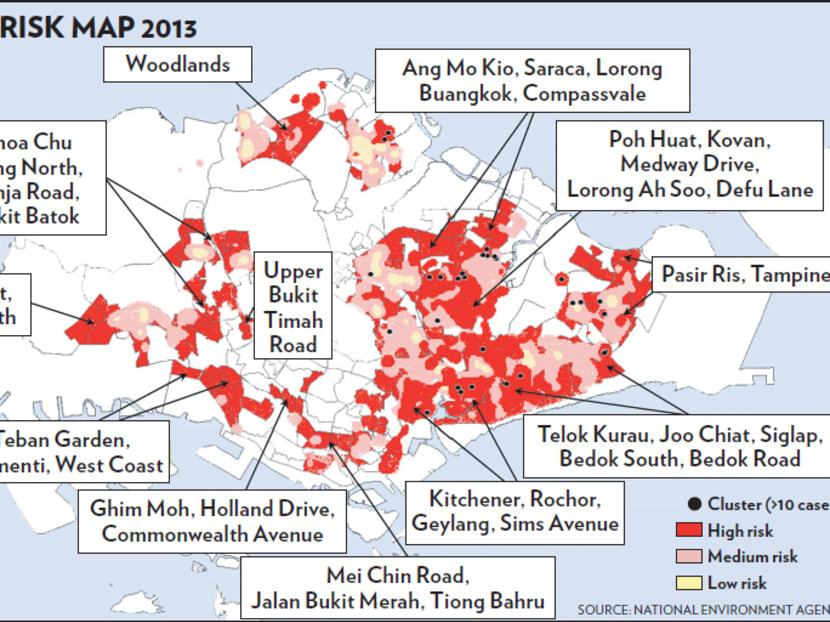Dengue cases could double
SINGAPORE — The National Environment Agency (NEA) has warned that the number of dengue cases reported last week — 492 or an eight-year weekly high — could worsen in five weeks.
SINGAPORE — The National Environment Agency (NEA) has warned that the number of dengue cases reported last week — 492 or an eight-year weekly high — could worsen in five weeks.
In a projection based on weather factors, mosquito breeding, previous dengue cases and seasonality, it estimated that numbers could double and possibly even breach 1,000 casesa week, before Singapore hits peak transmission season.
At a media briefing yesterday, Director of NEA’s Environment Health Institute Ng Lee Ching said: “492 cases a week is unprecedented for this part of the year, so we are entering the dengue season with a high base.”
While there is “a lot of uncertainty when it comes to modelling”, Ms Ng said that “with this trend, we cannot rule out the possibility that we will see a weekly number greater than that in 2005”. The peak dengue season usually occurs between May and October. In September 2005, the number of cases surged to an all-time high of 713.
The Environment Health Institute’s data have shown that the three dengue strains currently circulating have higher rates of transmission, signalling higher epidemic potential. In addition, Dengue Strain 1 — which the population has lower immunity against — has replaced Strain 2 as the predominant strain of infection.
To provide timely information in cluster zones, the NEA will be installing banners with colour codes indicating the seriousness of the situation from April 28.
A red-alert banner indicates a high-risk area with over 10 cases discovered, a yellow-alert banner refers to fewer than 10 cases, while a green banner means the area is in the clear but will be monitored for the next 21 days.
Said NEA’s Director of General Public Health Derek Ho: “Through this graduated alert system, we hope residents can take a greater interest in what’s happening in their neighbourhoods.”
For example, if on yellow alert, residents should do the five-step Mozzie Wipeout at least once a week, apply repellent and spray insecticide in the dark corners of their homes.
As of last week, 2,799 homes were found to be breeding mosquitos, with a spike in the number of breeding sites at HDB flats, apartments and condominiums. Since the beginning of this year, the NEA has fined 100 homeowners for breeding mosquitoes.
As part of the campaign, about 800 volunteers will be trained to educate residents to look out for and eradicate potential breeding spots.
At a forum held earlier this month, a participant suggested imposing stiffer fines on homeowners found to be breeding mosquitoes, a move Environment and Water Resources Minister Vivian Balakrishnan said he would consider.
When asked, Mr Ho yesterday reiterated that this “is under review”.
Members of Parliament (MP) TODAY spoke to said heftier fines cannot be the only solution.
Nee Soon GRC MP Lee Bee Wah said more efforts should be channelled to “instill(ing) a sense of emergency” in residents to encourage them to do their part for the community.
Added Mountbatten MP Lim Biow Chuan: “I believe many people are complacent rather than deliberate in allowing mosquitoes to breed ... greater awareness ... would be a better solution.” Woo Sian Boon







